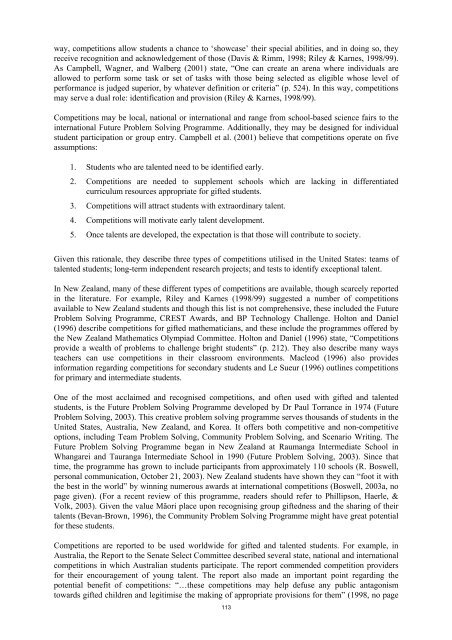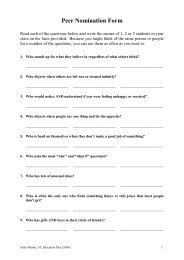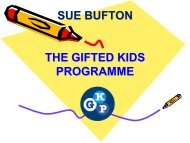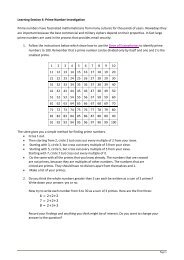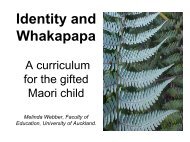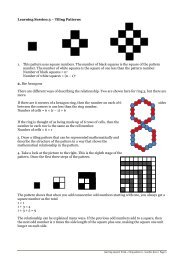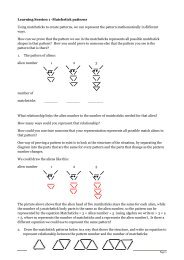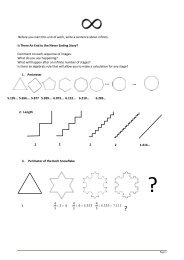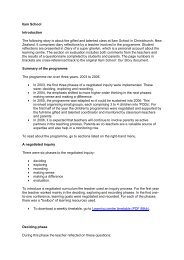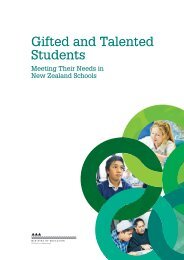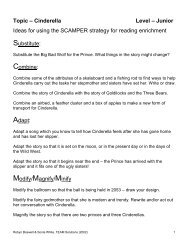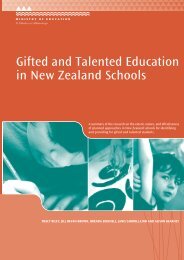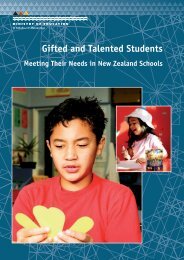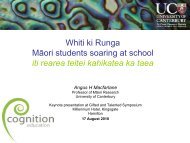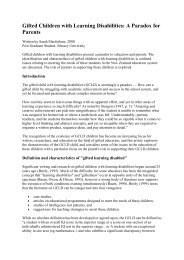The Extent, Nature and Effectiveness of Planned Approaches in ...
The Extent, Nature and Effectiveness of Planned Approaches in ...
The Extent, Nature and Effectiveness of Planned Approaches in ...
Create successful ePaper yourself
Turn your PDF publications into a flip-book with our unique Google optimized e-Paper software.
way, competitions allow students a chance to ‘showcase’ their special abilities, <strong>and</strong> <strong>in</strong> do<strong>in</strong>g so, theyreceive recognition <strong>and</strong> acknowledgement <strong>of</strong> those (Davis & Rimm, 1998; Riley & Karnes, 1998/99).As Campbell, Wagner, <strong>and</strong> Walberg (2001) state, “One can create an arena where <strong>in</strong>dividuals areallowed to perform some task or set <strong>of</strong> tasks with those be<strong>in</strong>g selected as eligible whose level <strong>of</strong>performance is judged superior, by whatever def<strong>in</strong>ition or criteria” (p. 524). In this way, competitionsmay serve a dual role: identification <strong>and</strong> provision (Riley & Karnes, 1998/99).Competitions may be local, national or <strong>in</strong>ternational <strong>and</strong> range from school-based science fairs to the<strong>in</strong>ternational Future Problem Solv<strong>in</strong>g Programme. Additionally, they may be designed for <strong>in</strong>dividualstudent participation or group entry. Campbell et al. (2001) believe that competitions operate on fiveassumptions:1. Students who are talented need to be identified early.2. Competitions are needed to supplement schools which are lack<strong>in</strong>g <strong>in</strong> differentiatedcurriculum resources appropriate for gifted students.3. Competitions will attract students with extraord<strong>in</strong>ary talent.4. Competitions will motivate early talent development.5. Once talents are developed, the expectation is that those will contribute to society.Given this rationale, they describe three types <strong>of</strong> competitions utilised <strong>in</strong> the United States: teams <strong>of</strong>talented students; long-term <strong>in</strong>dependent research projects; <strong>and</strong> tests to identify exceptional talent.In New Zeal<strong>and</strong>, many <strong>of</strong> these different types <strong>of</strong> competitions are available, though scarcely reported<strong>in</strong> the literature. For example, Riley <strong>and</strong> Karnes (1998/99) suggested a number <strong>of</strong> competitionsavailable to New Zeal<strong>and</strong> students <strong>and</strong> though this list is not comprehensive, these <strong>in</strong>cluded the FutureProblem Solv<strong>in</strong>g Programme, CREST Awards, <strong>and</strong> BP Technology Challenge. Holton <strong>and</strong> Daniel(1996) describe competitions for gifted mathematicians, <strong>and</strong> these <strong>in</strong>clude the programmes <strong>of</strong>fered bythe New Zeal<strong>and</strong> Mathematics Olympiad Committee. Holton <strong>and</strong> Daniel (1996) state, “Competitionsprovide a wealth <strong>of</strong> problems to challenge bright students” (p. 212). <strong>The</strong>y also describe many waysteachers can use competitions <strong>in</strong> their classroom environments. Macleod (1996) also provides<strong>in</strong>formation regard<strong>in</strong>g competitions for secondary students <strong>and</strong> Le Sueur (1996) outl<strong>in</strong>es competitionsfor primary <strong>and</strong> <strong>in</strong>termediate students.One <strong>of</strong> the most acclaimed <strong>and</strong> recognised competitions, <strong>and</strong> <strong>of</strong>ten used with gifted <strong>and</strong> talentedstudents, is the Future Problem Solv<strong>in</strong>g Programme developed by Dr Paul Torrance <strong>in</strong> 1974 (FutureProblem Solv<strong>in</strong>g, 2003). This creative problem solv<strong>in</strong>g programme serves thous<strong>and</strong>s <strong>of</strong> students <strong>in</strong> theUnited States, Australia, New Zeal<strong>and</strong>, <strong>and</strong> Korea. It <strong>of</strong>fers both competitive <strong>and</strong> non-competitiveoptions, <strong>in</strong>clud<strong>in</strong>g Team Problem Solv<strong>in</strong>g, Community Problem Solv<strong>in</strong>g, <strong>and</strong> Scenario Writ<strong>in</strong>g. <strong>The</strong>Future Problem Solv<strong>in</strong>g Programme began <strong>in</strong> New Zeal<strong>and</strong> at Raumanga Intermediate School <strong>in</strong>Whangarei <strong>and</strong> Tauranga Intermediate School <strong>in</strong> 1990 (Future Problem Solv<strong>in</strong>g, 2003). S<strong>in</strong>ce thattime, the programme has grown to <strong>in</strong>clude participants from approximately 110 schools (R. Boswell,personal communication, October 21, 2003). New Zeal<strong>and</strong> students have shown they can “foot it withthe best <strong>in</strong> the world” by w<strong>in</strong>n<strong>in</strong>g numerous awards at <strong>in</strong>ternational competitions (Boswell, 2003a, nopage given). (For a recent review <strong>of</strong> this programme, readers should refer to Phillipson, Haerle, &Volk, 2003). Given the value Mäori place upon recognis<strong>in</strong>g group giftedness <strong>and</strong> the shar<strong>in</strong>g <strong>of</strong> theirtalents (Bevan-Brown, 1996), the Community Problem Solv<strong>in</strong>g Programme might have great potentialfor these students.Competitions are reported to be used worldwide for gifted <strong>and</strong> talented students. For example, <strong>in</strong>Australia, the Report to the Senate Select Committee described several state, national <strong>and</strong> <strong>in</strong>ternationalcompetitions <strong>in</strong> which Australian students participate. <strong>The</strong> report commended competition providersfor their encouragement <strong>of</strong> young talent. <strong>The</strong> report also made an important po<strong>in</strong>t regard<strong>in</strong>g thepotential benefit <strong>of</strong> competitions: “…these competitions may help defuse any public antagonismtowards gifted children <strong>and</strong> legitimise the mak<strong>in</strong>g <strong>of</strong> appropriate provisions for them” (1998, no page113


